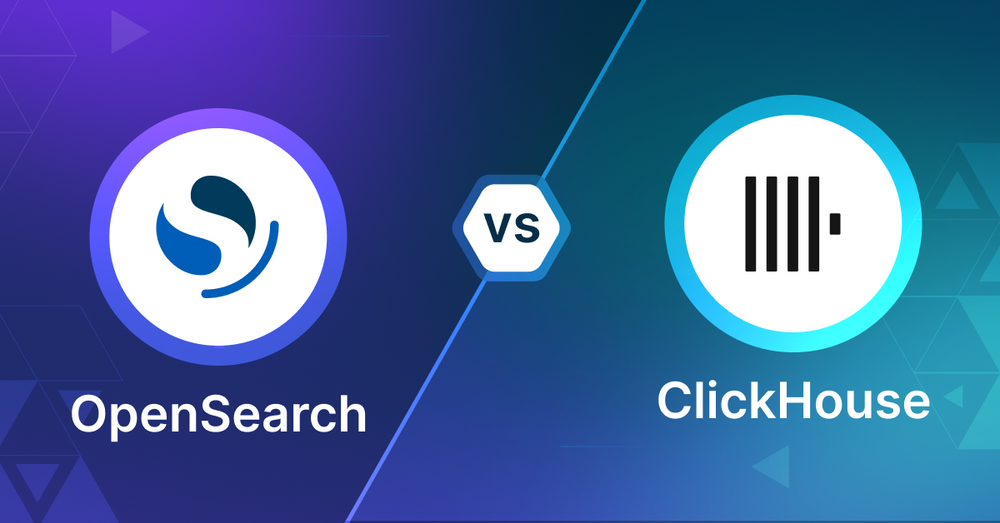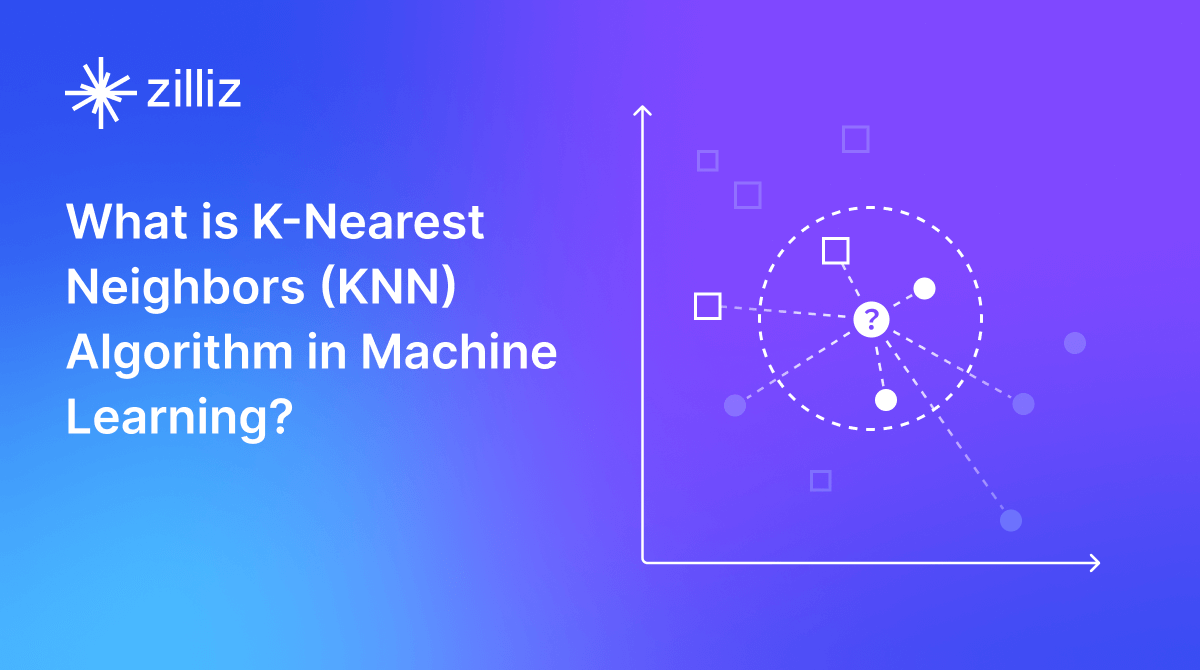OpenSearch vs ClickHouse: Selecting the Right Database for GenAI Applications

As AI-driven applications evolve, the importance of vector search capabilities in supporting these advancements cannot be overstated. This blog post will discuss two prominent databases with vector search capabilities: OpenSearch vs ClickHouse. Each provides robust capabilities for handling vector search, an essential feature for applications such as recommendation engines, image retrieval, and semantic search. Our goal is to provide developers and engineers with a clear comparison, aiding in the decision of which database best aligns with their specific requirements.
What is a Vector Database?
Before we compare OpenSearch and ClickHouse, let's first explore the concept of vector databases.
A vector database is specifically designed to store and query high-dimensional vectors, which are numerical representations of unstructured data. These vectors encode complex information, such as the semantic meaning of text, the visual features of images, or product attributes. By enabling efficient similarity searches, vector databases play a pivotal role in AI applications, allowing for more advanced data analysis and retrieval.
Common use cases for vector databases include e-commerce product recommendations, content discovery platforms, anomaly detection in cybersecurity, medical image analysis, and natural language processing (NLP) tasks. They also play a crucial role in Retrieval Augmented Generation (RAG), a technique that enhances the performance of large language models (LLMs) by providing external knowledge to reduce issues like AI hallucinations.
There are many types of vector databases available in the market, including:
- Purpose-built vector databases such as Milvus, Zilliz Cloud (fully managed Milvus)
- Vector search libraries such as Faiss and Annoy.
- Lightweight vector databases such as Chroma and Milvus Lite.
- Traditional databases with vector search add-ons capable of performing small-scale vector searches.
Both OpenSearch and ClickHouse are traditional databases that have evolved to include vector search capabilities as an add-on.
What is OpenSearch? An Overview
OpenSearch is a robust, open-source search and analytics suite that manages a diverse array of data types, from structured, semi-structured, to unstructured data. Launched in 2021 as a community-driven fork from Elasticsearch and Kibana, this OpenSearch suite includes the OpenSearch data store and search engine, OpenSearch Dashboards for advanced data visualization, and Data Prepper for efficient server-side data collection.
Built on the solid foundation of Apache Lucene, OpenSearch enables highly scalable and efficient full-text searches (keyword search), making it ideal for handling large datasets. With its latest releases, OpenSearch has significantly expanded its search capabilities to include vector search through additional plugins, which is essential for building AI-driven applications. OpenSearch now supports an array of machine learning-powered search methods, including traditional lexical searches, k-nearest neighbors (k-NN), semantic search, multimodal search, neural sparse search, and hybrid search models. These enhancements integrate neural models directly into the search framework, allowing for on-the-fly embedding generation and search at the point of data ingestion. This integration not only streamlines processes but also markedly improves search relevance and efficiency.
Recent updates have further advanced OpenSearch's functionality, introducing features such as disk-optimized vector search, binary quantization, and byte vector encoding in k-NN searches. These additions, along with improvements in machine learning task processing and search query performance, reaffirm OpenSearch as a cutting-edge tool for developers and enterprises aiming to fully leverage their data. Supported by a dynamic and collaborative community, OpenSearch continues to evolve, offering a comprehensive, scalable, and adaptable search and analytics platform that stands out as a top choice for developers needing advanced search capabilities in their applications.
What is ClickHouse? An Overview
ClickHouse is an open-source OLAP database for real-time analytics with full SQL support and fast query processing. It’s great for analytical queries because of fully parallelized query pipeline and can do vector search fast. It has high compression (customizable through codecs) so can store and query big datasets. One of its main advantages is that it can handle multi-TB datasets without being memory bound so it’s a great tool for users with large vector data. Also supports filtering and aggregation on metadata, so you can query vectors and their metadata.
ClickHouse has vector search functionality through SQL where vector distance operations are just like any other SQL function. So you can combine it with traditional filtering and aggregation. Great for use cases where you need to query vector data along with metadata or other information. Also has experimental Approximate Nearest Neighbour (ANN) indices for faster (but approximate) matching. And exact matching through linear scan over rows with parallel processing for speed and efficiency.
ClickHouse is great for vector search when you need to combine vector matching with metadata filtering or aggregation. Especially for very large vector datasets that need to be processed in parallel across multiple CPU cores. ClickHouse is also good when you need SQL support and your vector dataset is too big to fit in memory-only indices. Also if you already have related data in ClickHouse or don’t want to learn another tool to manage millions of vectors, ClickHouse can save you time and resources. Fast parallelized exact matching and handling big datasets is what ClickHouse is good for, so it’s for advanced search users.
ClickHouse is a general purpose platform for vector search, especially for large datasets that need parallel processing and when you combine vector search with SQL-based filtering and aggregation. Not as good as specialized vector databases for small memory-bound datasets or high-QPS scenarios but can handle complex queries including metadata so great for developers who know SQL and need fast vector search.
Comparing OpenSearch and ClickHouse: Key Differences for GenAI
Search Methodology
OpenSearch: Built on Apache Lucene, OpenSearch has advanced its search capabilities significantly, now including vector search with support for various machine learning-powered methods such as k-nearest neighbors (k-NN), semantic search, and hybrid search models. These features allow direct integration of neural models for dynamic embedding generation, enhancing both the efficiency and relevance of search operations.
ClickHouse: ClickHouse has integrated vector search capabilities into its SQL engine, supporting vector distance operations as SQL functions. This allows for efficient querying of vector data alongside traditional SQL queries, including metadata filtering and aggregation. ClickHouse also offers approximate and exact matching capabilities for vector data, optimized by parallel processing to handle large datasets efficiently.
Data Handling
OpenSearch: Manages a wide spectrum of data types, including structured, semi-structured, and unstructured data. The recent updates with disk-optimized vector search and enhancements in byte vector encoding have bolstered its ability to handle large and complex datasets, particularly in AI-driven applications.
ClickHouse: Primarily optimized for OLAP with a columnar data model, ClickHouse now also handles large vector datasets effectively, supporting high compression and parallelized data processing. It is adept at managing large volumes of data without being memory-bound, making it suitable for extensive analytical queries.
Scalability and Performance
OpenSearch: Highly scalable, leveraging its Lucene base to perform efficient full-text and vector searches across large datasets. The platform is designed to scale horizontally, enhancing its capability to handle growth in data volume seamlessly.
ClickHouse: Known for its ability to process queries rapidly due to its fully parallelized query pipeline, ClickHouse excels in scalability, particularly for real-time analytics on multi-terabyte datasets. Its architecture allows it to perform fast query execution across large and complex datasets.
Flexibility and Customization
OpenSearch: Provides extensive flexibility in data modeling and querying, supported by a rich set of APIs and plugins. The recent enhancements in search capabilities allow for a high degree of customization, catering to diverse and evolving application needs.
ClickHouse: While offering robust SQL support and customization options through SQL functions for vector search, ClickHouse's flexibility is more focused on analytical capabilities rather than text search. Its SQL-centric approach provides familiar tools for those with SQL expertise, enabling complex queries combined with vector operations.
Integration and Ecosystem
OpenSearch: Maintains a strong integration ecosystem, compatible with a variety of data collection, processing, and visualization tools. This ecosystem is backed by a dynamic and collaborative community that contributes to its continuous evolution.
ClickHouse: Also boasts significant integration capabilities, particularly with tools that support analytics and data warehousing. Its ability to handle SQL queries allows for straightforward integration with existing SQL-based systems and workflows.
Ease of Use
OpenSearch: Despite its sophisticated capabilities, OpenSearch maintains a manageable learning curve, supported by comprehensive documentation and a supportive community that eases setup and maintenance.
ClickHouse: ClickHouse requires familiarity with advanced SQL and database optimization, potentially presenting a steeper learning curve. However, its detailed documentation and active community provide valuable support for new users.
Cost Considerations
OpenSearch: As an open-source solution, OpenSearch can be cost-effective if self-managed. However, operational costs, especially for large deployments, can be significant. Managed services like Amazon OpenSearch Service are convenient but add to the cost.
ClickHouse: ClickHouse's high data compression rates and efficient processing capabilities make it a cost-effective option for large-scale data analysis. While it offers cost advantages, especially in handling large datasets, managed services and premium features can increase overall costs.
Security Features
OpenSearch: Offers robust security features including encryption, role-based access control, and audit logging, ensuring comprehensive security for data in transit and at rest.
ClickHouse: Provides essential security features such as SSL/TLS encryption and role-based access control. Additional security measures may be required to match the comprehensive security features offered by OpenSearch.
When to Choose OpenSearch and ClickHouse for GenAI
Choose OpenSearch for Vector Search when:
- Integrated Search Needs: You want to combine vector search with traditional full-text search capabilities. OpenSearch supports a variety of search methodologies including k-nearest neighbors (k-NN), semantic search, and hybrid models, allowing for sophisticated search scenarios.
- Real-time Search and Analytics: You need the ability to perform vector search in real-time while also requiring analytics and data visualization capabilities. OpenSearch can handle real-time data processing and offers tools for immediate data visualization and insights.
- Machine Learning Enhancements: Your application benefits from machine learning models that improve search accuracy and relevance, particularly when working with complex data types or requiring on-the-fly embedding generation.
Choose ClickHouse for Vector Search when:
- High-Performance Analytics: You require fast and efficient querying over very large datasets, particularly where you need to combine vector matching with detailed SQL-based data filtering and aggregation.
- Handling Massive Datasets: Your vector search operations need to scale to large volumes of data without compromising performance. ClickHouse is optimized for handling multi-terabyte datasets efficiently, making it ideal for heavy analytical workloads.
- SQL-based Vector Operations: You prefer to use SQL for vector search operations, integrating vector distance calculations directly into SQL queries. This is particularly useful when your vector search needs to be combined with complex SQL queries involving large datasets.
When to Choose a Specialized Vector Database?
While OpenSearch and ClickHouse offer vector search capabilities through an extension, they are not optimized for large-scale, high-performance vector search tasks. If your application relies on fast, accurate similarity searches over millions or billions of high-dimensional vectors, such as in image recognition, e-commerce recommendations, or NLP tasks, specialized vector databases like Milvus and Zilliz Cloud (the managed Milvus) are a better fit. These databases are built to handle vector data at scale, using advanced Approximate Nearest Neighbor (ANN) algorithms (e.g., HNSW, IVF ) and offering advanced features like hybrid search (including hybrid sparse and dense search, multimodal search, vector search with metadata filtering, and hybrid dense and full-text search), real-time ingestion, and distributed scalability for high-performance in dynamic environments.
On the other hand, general-purpose systems likeOpenSearch and ClickHouse are suitable when vector search is not the primary focus, and you’re handling structured or semi-structured data with smaller vector datasets or moderate performance requirements. If you already use these systems and want to avoid the overhead of introducing new infrastructure, vector search plugins can extend their capabilities and provide a cost-effective solution for simpler, lower-scale vector search tasks.
Using Open-source VectorDBBench to Evaluate and Compare Vector Databases on Your Own
VectorDBBench is an open-source benchmarking tool designed for users who require high-performance data storage and retrieval systems, particularly vector databases. This tool allows users to test and compare the performance of different vector database systems such as Milvus and Zilliz Cloud (the managed Milvus) using their own datasets, and determine the most suitable one for their use cases. Using VectorDBBench, users can make informed decisions based on the actual vector database performance rather than relying on marketing claims or anecdotal evidence.
VectorDBBench is written in Python and licensed under the MIT open-source license, meaning anyone can freely use, modify, and distribute it. The tool is actively maintained by a community of developers committed to improving its features and performance.
Download VectorDBBench from its GitHub repository to reproduce our benchmark results or obtain performance results on your own datasets.
Take a quick look at the performance of mainstream vector databases on the VectorDBBench Leaderboard.
Read the following blogs to learn more about vector database evaluation.
Further Resources about VectorDB, GenAI, and ML
- What is a Vector Database?
- What is OpenSearch? An Overview
- What is ClickHouse? An Overview
- Comparing OpenSearch and ClickHouse: Key Differences for GenAI
- When to Choose OpenSearch and ClickHouse for GenAI
- When to Choose a Specialized Vector Database?
- Using Open-source VectorDBBench to Evaluate and Compare Vector Databases on Your Own
- Further Resources about VectorDB, GenAI, and ML
Content
Start Free, Scale Easily
Try the fully-managed vector database built for your GenAI applications.
Try Zilliz Cloud for FreeKeep Reading

Why Context Engineering Is Becoming the Full Stack of AI Agents
Context engineering integrates knowledge, tools, and reasoning into AI agents—making them smarter, faster, and production-ready with Milvus.

What is the K-Nearest Neighbors (KNN) Algorithm in Machine Learning?
KNN is a supervised machine learning technique and algorithm for classification and regression. This post is the ultimate guide to KNN.

Long List of Awesome DeepSeek Integrations You Should Know
Discover how DeepSeek's affordable AI ecosystem challenges Silicon Valley giants with powerful integrations for developers and businesses—from RAG systems to productivity tools, all at 90% lower cost.
The Definitive Guide to Choosing a Vector Database
Overwhelmed by all the options? Learn key features to look for & how to evaluate with your own data. Choose with confidence.